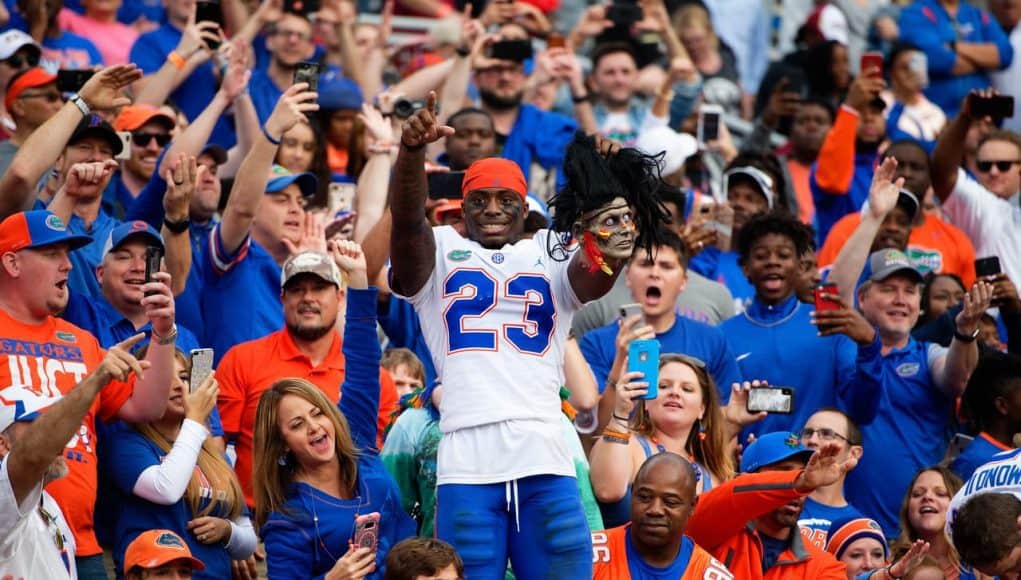It took a threat from the Governor of Florida to get the two teams to start playing and a global pandemic 64 years later to keep them from meeting on the gridiron.
For the first time since 1957 Florida and Florida State won’t meet on the football field this season.
Thursday the SEC announced that it would move to a conference-only schedule in 2020, joining the Big Ten and Pac-12, in an effort to combat the COVID-19 pandemic and provide a safe avenue for football to return in the fall.
“We believe these schedule adjustments offer the best opportunity to complete a full season by giving us the ability to adapt to the fluid nature of the virus and the flexibility to adjust schedules as necessary if disruptions occur,” SEC Commissioner Greg Sankey said. “It is regrettable that some of our traditional non-conference rivalries cannot take place in 2020 under this plan, but these are unique, and hopefully temporary, circumstances that call for unconventional measures.”
Despite the ACC announcing a move to a “plus 1” schedule, which allows for their teams to play one out of conference opponent a year the SEC’s decision will not allow for that to happen. The decision not only affects Florida and Florida State but four other SEC schools have annual in-state rivalries with an ACC team, including South Carolina and Clemson, who have played every year since 1909.
The decision wasn’t easy, nor was it unanimous, sources told Gator Country. Scott Stricklin has publically lobbied for Florida and Florida State to play, if football were possible, in 2020. While on a Zoom video call with reporters on Thursday, Stricklin was a company man and backed the SEC but neither he nor FSU Athletic Director David Coburn.
The reason that this version of the schedule came to be is based on the league wanting to start the season later.
“All the medical experts that we hear from—the epidemiologist, the infectious disease experts, the people who are leaders public health—they will tell you that the month of August through Labor Day has a chance to be kind of rough in our region from a caseload standpoint, especially reintegrating schools and campuses and everything else. So trying to start a football season with that as a background, without having the benefit of having watched the NFL get started, just became—for me personally—became problematic,” Stricklin said. “So the idea that we can get away from Labor Day a little bit, we can have some time to watch the NFL, see what we can learn from them. Given what’s going on, this is serious stuff, right? And for all the talk about—hey we wanna play our in-state rival, but for all the talk about that, we’ve got a pandemic going that’s totally changing what normal is. and so, could we get away from Labor Day and buy some time? Hopefully, let the numbers level off and come down.”
When the league made the concession to move the scheduled start of the season from September 5 to September 26 and move the SEC Championship from December 5 to December 19 that gave them 11 weeks to play 10 conference games.
Stricklin wasn’t the only athletic director to lobby for a “plus 1” model.
“There were some other voices as well. But probably the thing that drove that decision the most was once you start looking at starting late September, and there was a consensus that we wanted to try to play 10 conference games, you start really impacting the number of opportunities you have to play those games,” Stricklin said. “And so, the league made the decision. We made the decision we wanted to move the conference championship game back a couple of weeks. We wanted to keep that Dec. 12 date available for any rescheduling that needed to occur. And once you do that, you have 11 Saturdays left to play 10 conference games. It just, we ran out of Saturdays. So the decision to delay was based on safety and health of our campuses based on the guidance we’re all getting from health officials. It’s just a function of where we ended up because of the way the schedule worked out.”
There’s not a Gator fan in the country that will be happy to hear the news that Florida State isn’t on the schedule. The fact of the matter is the SEC had to do whatever it could to try and make football feasible. There isn’t much the University of Florida or Florida State can do about it either.
“As members of the SEC we’re kind of bound by their rules,” Stricklin said. “And right now they’ve precluded all non-conference activity in the sport of football for this year. So as difficult as that is for us all in the state of Florida to wrap our minds around, that’s where we’re going to be for the fall of 2020.”


